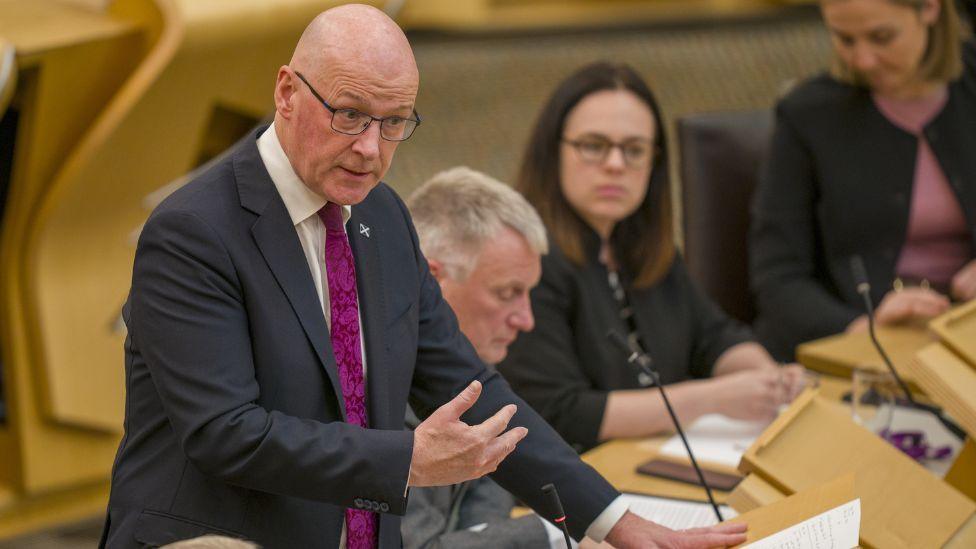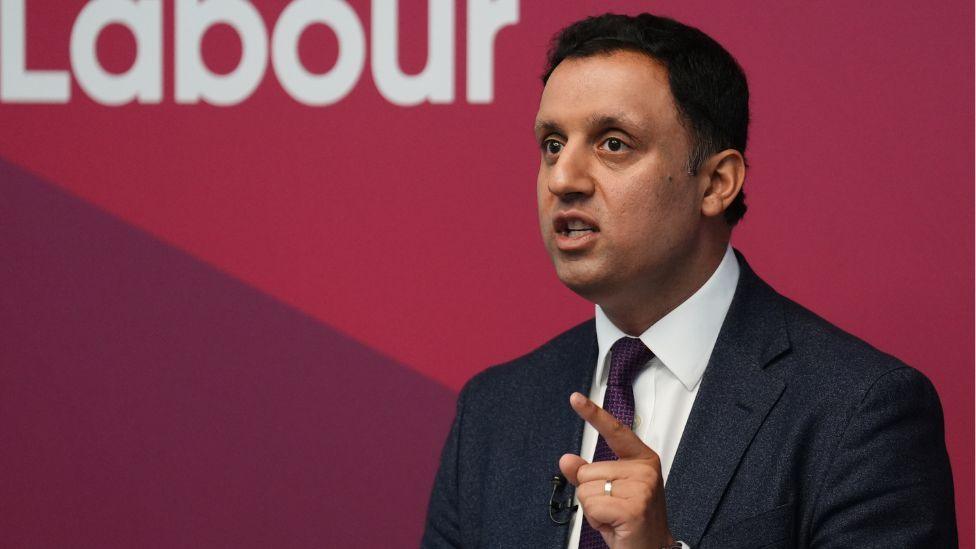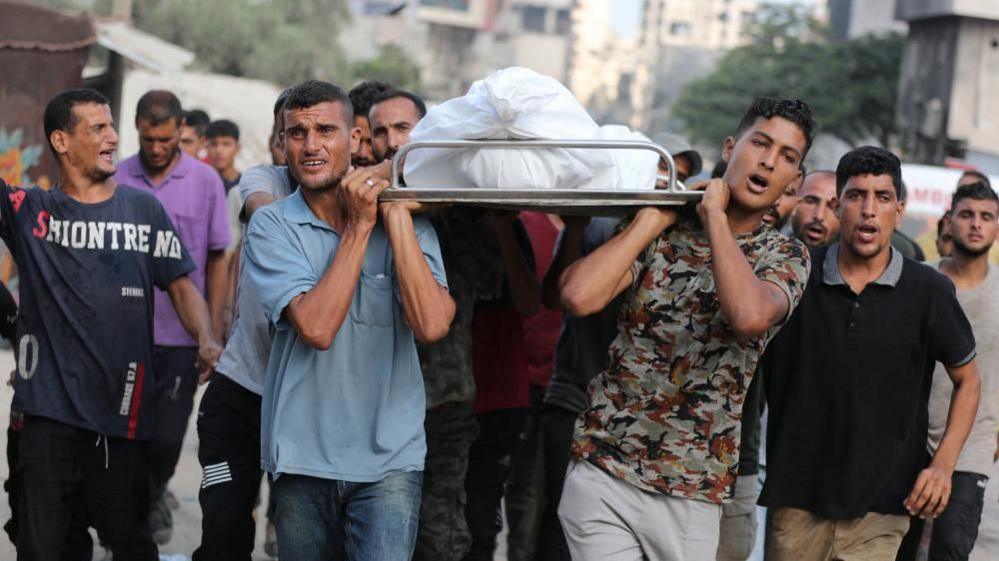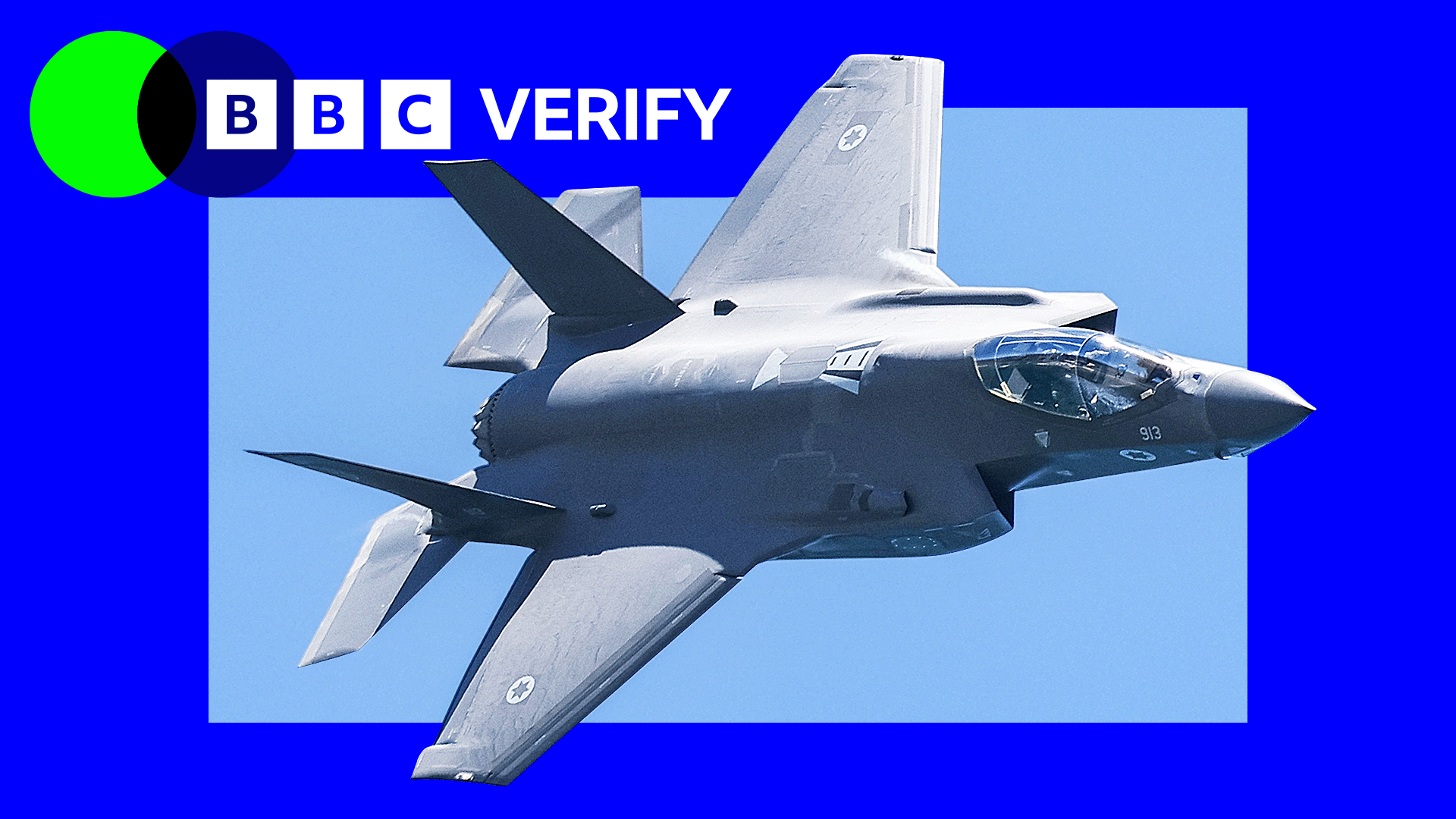Swinney pauses new funding for arms firms supplying Israel

John Swinney said there was plausible evidence that Israel was committing genocide in Gaza
- Published
The Scottish government is to pause new awards of public money to arms companies supplying Israel, John Swinney has announced.
The first minister said there was plausible evidence that Israel was committing genocide in Gaza - an accusation the Israeli government rejects.
He called for the recognition of a Palestinian state - a move the UK government has said it will do this month if Israel does not meet certain conditions, including a ceasefire.
While tightening restrictions for Israel, Swinney also announced his government would lift a ban on public funding for munitions, allowing for increased support for Ukraine and UK defence.
In a statement to parliament, Swinney said the Scottish government could not ignore "prima facie evidence" that Israel was committing genocide.
As he addressed MSPs, a Palestinian flag was flown above the government's headquarters at St Andrew's House.
The first minister said the move would show "Scotland's solidarity" with Palestinians.
'Student politics' row over SNP arms funding policy
- Published1 June
What does recognising a Palestinian state mean?
- Published22 September
He said: "Previously, we have provided business grants and investment support to companies involved in the design, production, supply and support for military equipment, technologies and services."
Swinney told parliament that was a necessary duty of government, citing the war in Ukraine to underline the importance of defence.
The first minister said: "In recognition of that changed international landscape, the Scottish government will lift the restriction that we have applied on the use of support for the production of munitions, but in the face of genocide, there can be no business as usual.
"We will pause new awards of public money to arms companies whose products or services are provided to countries where there is plausible evidence of genocide being committed by that country - that will include Israel."
'Student union politics'
The pause will apply to funding from the government, the Scottish National Investment Bank and the nation's enterprise agencies.
The Scottish government was recently accused of "student union politics" by the UK government over its long-standing policy of not providing public funding for munitions.
The funding, according to ministers, is usually provided for apprenticeships with arms firms.
However, Swinney vowed that money already pledged for apprenticeships at firms affected by the decision would be honoured.
The first minister also announced that 20 children injured in Gaza would be brought to Scotland for medical treatment, while £400,000 was pledged for a rapidly deployable hospital for use in Gaza.
Swinney called on Prime Minister Sir Keir Starmer to withdraw from the UK-Israel free trade agreement.
The Labour government suspended talks to upgrade that deal in May, with Foreign Secretary David Lammy calling the Israeli treatment of Palestinians "an affront to the values of the British people".
Sir Keir has said his government will recognise a Palestinian state unless Israel agrees to a ceasefire, commits to a long-term sustainable peace that delivers a two-state solution, and allows the United Nations to restart the supply of aid to Gaza.

Scottish Labour leader Anas Sarwar has accused Israel of genocide
Scottish Conservative leader Russell Findlay said the situation in Gaza was a "blight on humanity".
However, he told MSPs that SNP ministers should use their powers "to improve people's lives here in Scotland", citing drugs deaths, crime, and the NHS.
Findlay said many people would see the proposal to recognise a Palestinian state as "premature, impractical and counter-productive".
Scottish Labour leader Anas Sarwar said the situation in Gaza was "beyond intolerable", adding: "The illegal occupation and genocide must end now."
Those comments mark a significant point of difference from Prime Minister Sir Keir Starmer, who has never accused Israel of genocide.
Sarwar called for an immediate ceasefire, the free flow of humanitarian aid, the release of all hostages and a two-state solution to the conflict.
Scottish Green co-leader Ross Greer welcomed the first minister's announcement but called on him to go further and urge all Scottish businesses to boycott Israel, a call Swinney rejected.
Jamie Livingstone, head of Oxfam Scotland, also welcomed the statement.
He said: "Pausing new public funding to arms companies in Scotland implicated in this devastation is a vital act of solidarity. It must be implemented quickly and robustly."
Genocide court case
The UN's top court, the International Court of Justice (ICJ), is considering a case brought by South Africa that argues that Israel is committing genocide.
The ICJ, which is yet to deliver a ruling, has granted Israel an extension until January 2026 to present its defence.
Israel has alleged that the ICJ case is motivated by antisemitism.
According to the Hamas-run Ministry of Health, more than 60,000 people have been killed in the conflict since October 2023 - when Hamas fighters attacked Israel - killing about 1,200 people. That sparked a massive Israeli military response.
UN agencies have said there is "man-made mass starvation" in Gaza, blaming the humanitarian crisis on Israel, which controls the entry of all supplies to the territory.
Israel has insisted there are no restrictions on aid deliveries and that there is "no starvation".
Earlier this week the world's leading association of genocide scholars declared that Israel was committing genocide in Gaza.
The International Association of Genocide Scholars (IAGS) said that Israel's conduct met the legal definition as laid out in the UN convention on genocide.
The Israeli Foreign Ministry said the IAGS report was based on "Hamas lies" and poor research.
A spokesperson added that it was Israel that was the victim of genocide.
- Published1 September

- Published22 July
